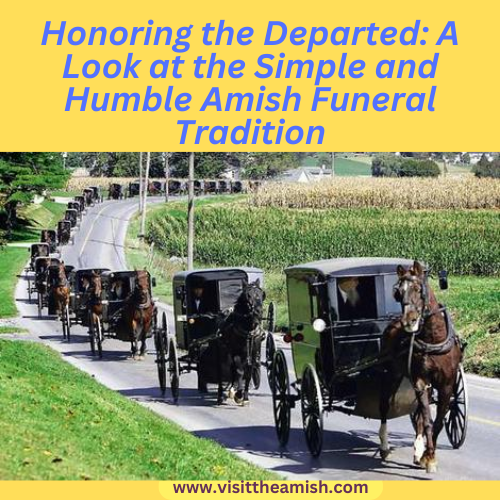Amish funerals are typically simple and solemn affairs, reflecting the Amish belief in humility and simplicity. They are usually held within two days of the death, and typically take place in the home of the deceased or in a meetinghouse.
Funerals are generally open to the community and family members and friends, and visitors of different backgrounds are welcome to attend. The Amish do not embalm the body, and there is usually no viewing of the body before the funeral. Instead, the body is typically buried in a plain wooden casket, which is made by members of the community.
The funeral service is usually conducted in the German language and is led by an Amish bishop. The service is typically focused on comforting the bereaved, and it is common for multiple hymns to be sung, and scriptures to be read. Prayers will be said, and the preacher will provide a short eulogy.
The service is typically conducted in a very simple manner and emphasizes the importance of faith and humility, and the assurance of an afterlife.
The Amish believe that death is not the end, but rather the beginning of eternal life with God, and the service will reflect this belief.
After the service, the immediate family will typically gather around the grave, which is typically located in a nearby Amish cemetery, for the burial. As with all aspects of Amish funerals, graves are simple and without markers, only a plain fieldstone is used.
It’s worth noting that, the Amish way of life and funerals can vary from community to community and region to region, and may have variations or added customs and practices. However, all will maintain the basic belief in simplicity and humility, and the focus on the importance of faith, comfort and the assurance of an afterlife.
In addition to the simplicity of the funeral service and the burial, Amish funerals also typically lack the extensive use of flowers and other decorations that are often present in traditional funerals. This is because the Amish believe in humility and simplicity, and they see such things as unnecessary adornments that could detract from the solemnity of the occasion.
Another aspect of Amish funerals is the tradition of “sitting up with the dead”. This is when family and close friends take turns staying with the deceased until the time of the funeral. This is a time of silent reflection, prayer, and mourning. This practice is rooted in the belief that the deceased should not be left alone, and it’s a way to honor the person who passed away.

STOCK PHOTO
Additionally, the Amish community is known for its strong sense of mutual aid and support, and this is especially true during times of grief.
It is common for members of the community to offer their help and support to the family of the deceased, whether it’s by offering meals, assistance with funeral preparations, or other forms of support.
It’s also worth noting that, Some communities have the practice of footwashing ceremony, typically held before the funeral service, this practice is based on the biblical account of Jesus washing his disciples’ feet, it is a symbolic act of humility and service to others.
In conclusion, Amish funerals are characterized by their simplicity, humility and focus on faith, community, and the assurance of an afterlife. The customs, traditions, and practices of an Amish funeral can vary among communities, but all will reflect the basic values of simplicity and humility, with a strong sense of mutual aid and support in times of grief. The lack of extensive use of flowers and other decorations, the tradition of sitting up with the dead, and the mutual aid and support from the community, all reflect the importance of humility, simplicity and community in the Amish way of life.

